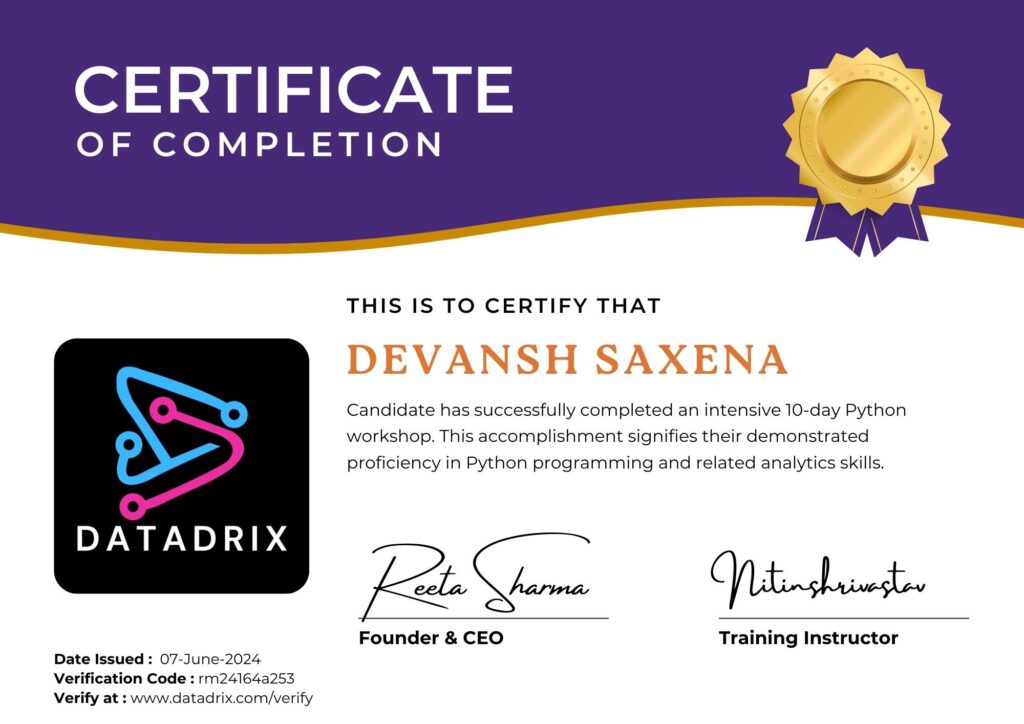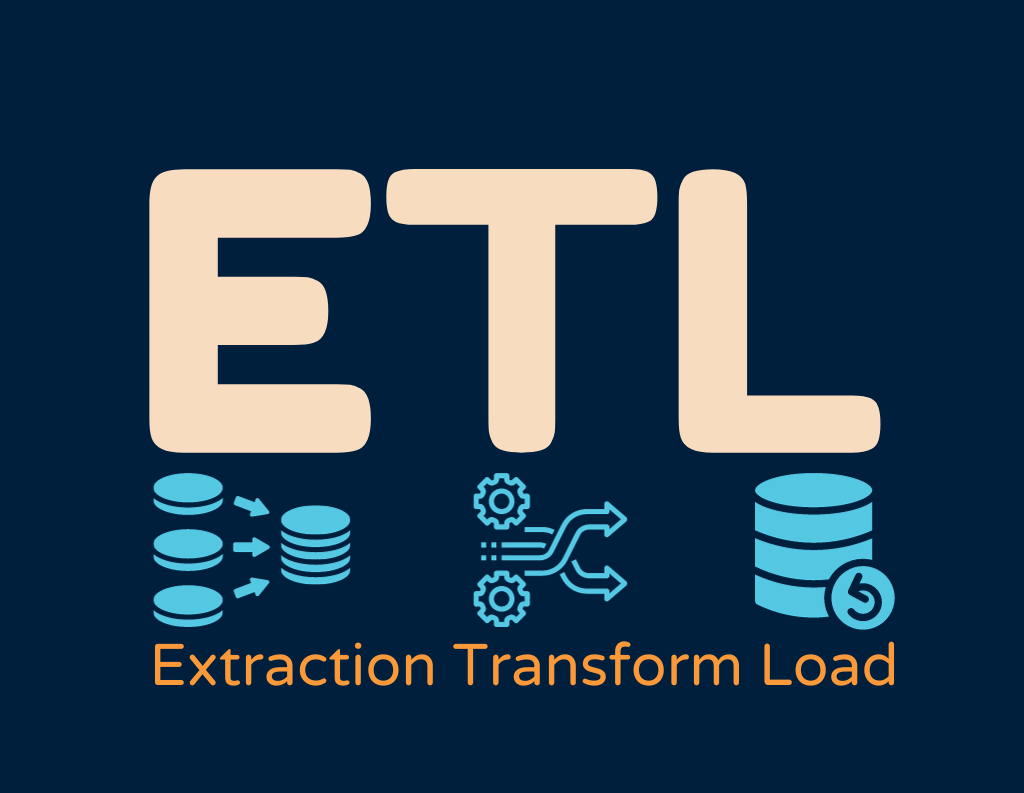
DATADRIX : Data Science
Navigating the World of Data Science
Harnessing the power of data to gain valuable insights and make informed decisions. Combining statistical analysis, machine learning, and domain expertise to extract meaning from complex datasets. Driving innovation & solving complex problems through data-driven approaches & predictive modeling. By combining techniques from statistics, computer science & domain expertise, data scientists uncover hidden patterns & trends within vast datasets. These revelations drive informed decision-making, improve processes, and unlock innovation in a wide range of fields, from business and healthcare to technology and beyond. With the ability to turn data into actionable intelligence.
Course Curriculum
A syllabus is a meticulously crafted document that serves as a comprehensive roadmap for the training program. It plays a pivotal role in guiding candidate along their learning journey, offering a structured framework for acquiring knowledge and honing skills.
Module 1
Module 2
Module 3
Module 4
Internship Program
This internship is a part of the course curriculum to help you gain real experience in the Data Science domain.During this internship, you will go through various challenges which you allow to explore new skills and push your limits while learning something new during the projects.
Topics Covered :
Integration of python & SQL
Web Scrapping
Data Cleaning with Python
Model Evaluation
Git / Github Integration
End to End Projects
Interview Preparation
Datadrix offers top-notch placement opportunities. With strong industry ties and modern training, we excel in placing our candidates. Our results speak to our commitment to shaping successful careers. Our approach ensures to open pathway for learners to achieve good growth in the domain
Activities Covered :
Interview Pattern Preparation
Mock Interview Practice Sessions
Preparation as per Job Description
Placement Ready Session for Working Professionals
Technical Screening for technical strengthening
Screening for effective communication check
Placement
Datadrix offers top-notch placement opportunities. With strong industry ties and modern training, we excel in placing our candidates. Our results speak to our commitment to shaping successful careers. Our approach ensures to open pathway for learners to achieve good growth in the domain
Duration
Our 150+ hour data science course offers in-depth training and hands-on experience, covering everything from data collection to advanced analysis and visualization, preparing you to excel in the data-driven world.
Assignments
Our data science course includes assignments that offer hands-on training and cover data collection, analysis, and visualization, equipping you with essential skills for real-world professional success.
Projects
Our data science course features projects that offer practical, hands-on training in data collection, analysis, and visualization, equipping you with essential skills and real-world experience for success.
Live Classes
Our data science course includes live classes offering hands-on training and real-time guidance. From data collection to advanced analysis and visualization, you’ll gain essential skills to excel in today’s tech-driven world.
Classnotes
Our data science course includes detailed class notes that cover data collection, analysis, and visualization, providing the essential skills and practical knowledge needed to excel in the tech-driven world.
Interview Preparation
Our data science course includes targeted interview preparation, covering data collection, analysis, and visualization. This training equips you with the essential skills needed to excel in interviews and succeed in the tech-driven world.
Placements
Our data science course offers dedicated placement support, focusing on data collection, analysis, and visualization. This training equips you with the skills needed to succeed in the tech-driven world and secure your ideal job.
An Awesome Community
Our students, instructors and mentors come from different colleges, companies, and walks of life.
Meet our team & students

Joining DATADRIX means you’ll create an amazing network, make new connections, and Leverage Diverse Opportunities

“Validate Your Expertise and Propel Your Career”
Data Science
Building Tomorrow’s Solutions from Today’s Data
A data science course is a structured educational program designed to teach individuals the knowledge, skills, and tools necessary to work as a data scientist. The course typically covers a wide range of topics, including statistics, machine learning, data analysis, data visualization, programming languages (such as Python or R), and data manipulation techniques. Through hands-on projects and practical exercises, participants gain experience in working with real-world datasets and applying data science methodologies to solve complex problems. The goal of a data science course is to equip individuals with the necessary skills to collect, analyze, and interpret large volumes of data to drive informed decision-making and derive actionable insights.
Our Data Science course is designed to empower you with the knowledge and skills needed to navigate the complex world of data. In an era where data is the driving force behind decision-making, understanding how to collect, analyze, and interpret data is crucial. Our program covers a wide range of topics, from statistical analysis and machine learning to data visualization and Big Data technologies. With the guidance of our expert instructors, you’ll become proficient in Python, R, and data analytics tools. By the end of this course, you’ll be well-equipped to unlock actionable insights from data and shape the future of industries.
Practical experience is at the core of our Data Science course. We believe that learning by doing is the most effective way to master data analysis and machine learning. You’ll work on real-world projects, explore large datasets, and apply your knowledge to solve complex problems. From predictive modeling to natural language processing, our hands-on approach ensures that you gain the confidence to tackle any data-related challenge that comes your way.
The field of Data Science offers a multitude of career opportunities, and our course is designed to make you job-ready. We provide career guidance and support, helping you connect with potential employers and showcasing your skills through certification. Whether you’re an aspiring Data Scientist or a professional looking to upskill, our Data Science course is your pathway to a rewarding and in-demand career.
Join our Data Science course to embark on a transformative journey into the world of data analysis, machine learning, and data-driven decision-making. Harness the power of data and shape your future with us.
In-Demand Skill: These skills are in high demand across various industries, making you a valuable asset in today’s data-driven world. Whether you’re a data enthusiast or a professional aiming to stay competitive, this course opens doors to exciting career opportunities and empowers you to navigate the evolving landscape of data science.
Beginner-Friendly: We provide a supportive and accessible learning environment, where you’ll build a strong foundation in data science without the need for extensive prior experience in the field. Through hands-on projects and step-by-step guidance, beginners can grasp the core concepts and practical skills required for a successful journey into data science.
Versatility: This versatility empowers you to work across diverse industries, including healthcare, finance, e-commerce, and more, where data-driven decisions and solutions are in high demand.
Structured Learning: Our data science course offers structured learning that provides a clear and organized path to mastering the field of data science. Through carefully designed modules and lessons, you’ll develop a deep understanding of data analysis, statistics, machine learning, and data visualization
Hands-On Practice: This practical approach ensures that you’re not just learning theory but also developing the expertise to tackle data-driven challenges effectively in various domains.
Customized Learning Paths: Our Data Science course offers customized learning paths tailored to meet the specific needs of each student. Whether you’re a beginner or an experienced data professional, you can choose a learning path that aligns with your current knowledge and career goals.
Experienced Instructors: Our data science course is led by experienced instructors who bring a wealth of industry knowledge to the classroom. These instructors have a proven track record in data science, having worked on real-world projects and complex data analysis.
Career Advancement: It’s a powerful step toward career advancement, as businesses and organizations increasingly rely on data scientists to inform their strategies and stay competitive in today’s data-driven world
Job Placement Support: Our team is dedicated to connecting you with potential employers, offering resume building and interview preparation, and ensuring that you are well-prepared to embark on a successful career in data science..
Community and Networking: Students not only learn data analysis, machine learning, and statistics but also cultivate relationships with peers, instructors, and industry professionals. This unique blend of education and networking enhances opportunities for sharing knowledge, collaborating on real-world projects, and fostering a supportive data science community.
Certification: Participants in this course delve into various aspects of data science, including data preprocessing, statistical analysis, machine learning, and data visualization.
Continuous Learning: It offers ongoing education to keep professionals’ skills and knowledge relevant in a rapidly evolving field. This type of course provides access to the latest industry trends, tools, and techniques, enabling students to remain at the forefront of data science, make informed decisions, and maintain their competitive edge.
Ongoing Support: Even after completing the training, you’ll have access to resources and support, ensuring you stay up-to-date with the latest developments in Data Science.
Embarking on a Machine Learning training journey at DATADRIX is an investment in your future, whether you’re just starting your career or looking to further develop your skills. We welcome both fresher and experienced students to join us and explore the exciting world of IT Technologies.
Key Features & Benefits

Frequently Asked Questions

Prerequisites for Data Science
Knowledge of data manipulation, analysis, and visualization tools is beneficial for a comprehensive understanding of the field.

What is ETL Process in data science
Raw Data extracted, transformed into a structured format, and then loaded into a target database for further analysis

Career in Data Science Course in india
With high demand and diverse applications, professionals play a pivotal role in shaping the future of technology and business.

Does Data Science have future
Increasing demand for skilled data scientists reflects its sustained importance in shaping the future of technology and business.















